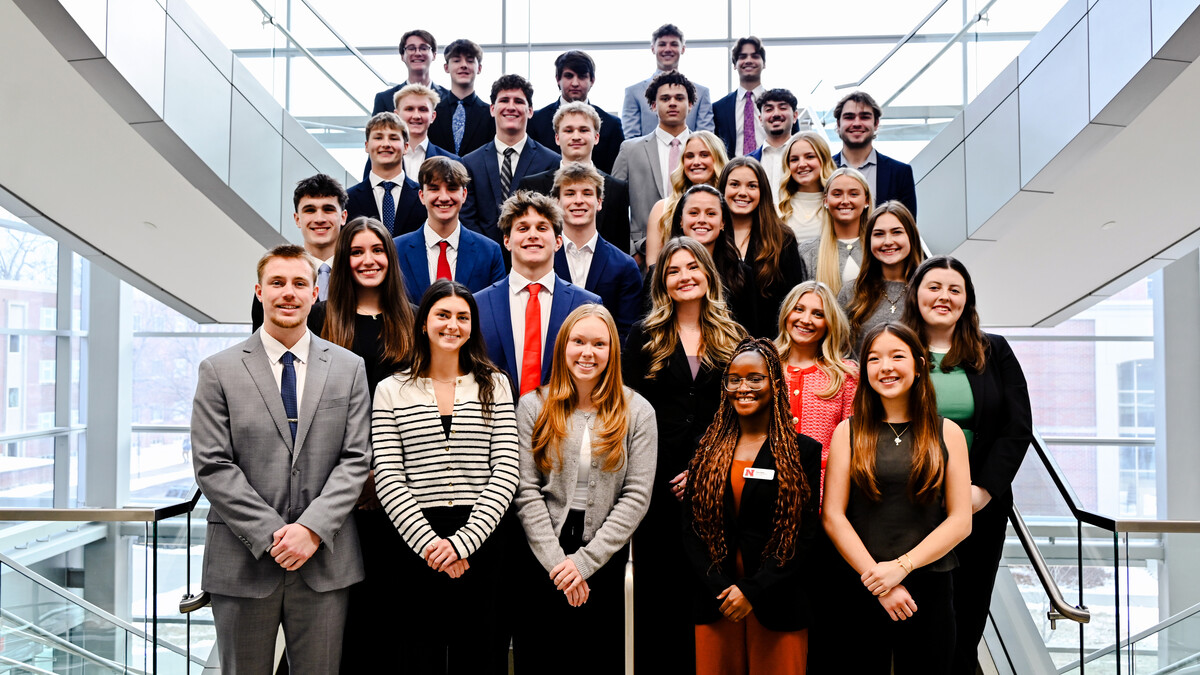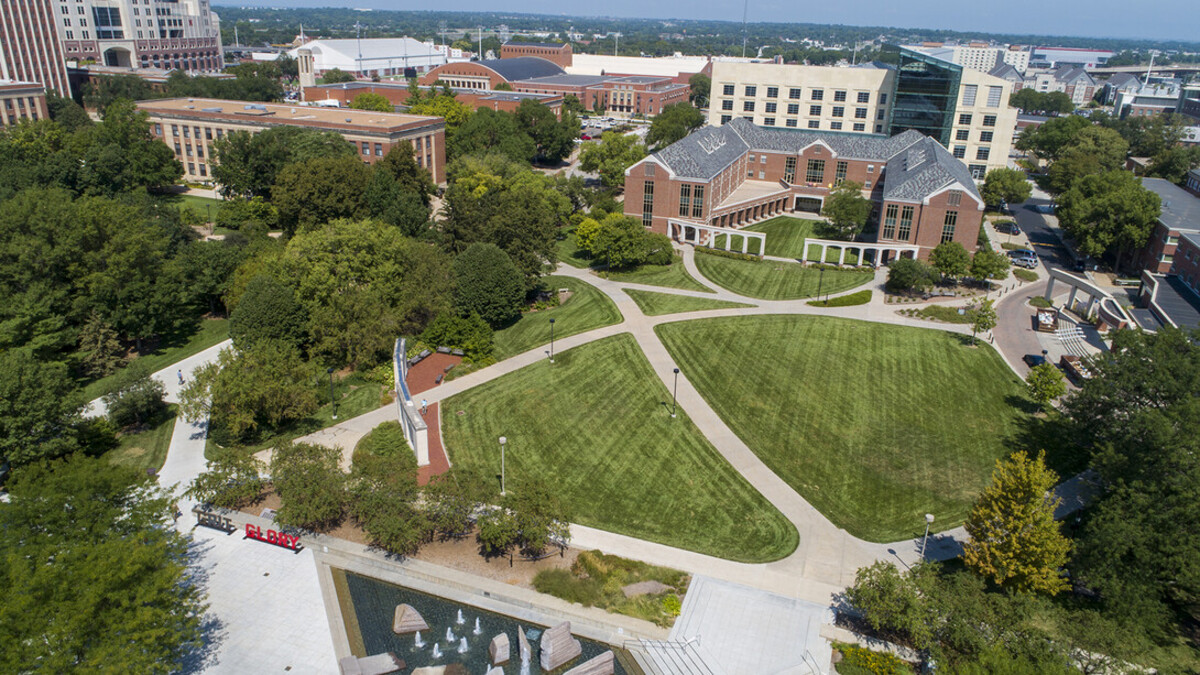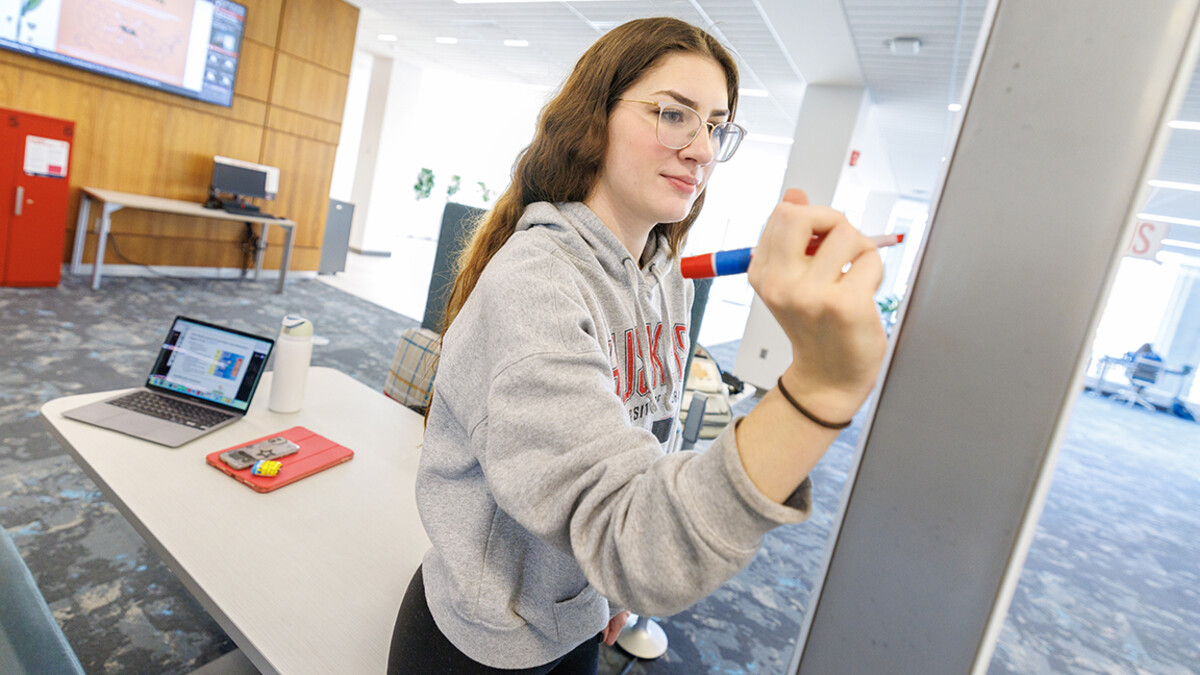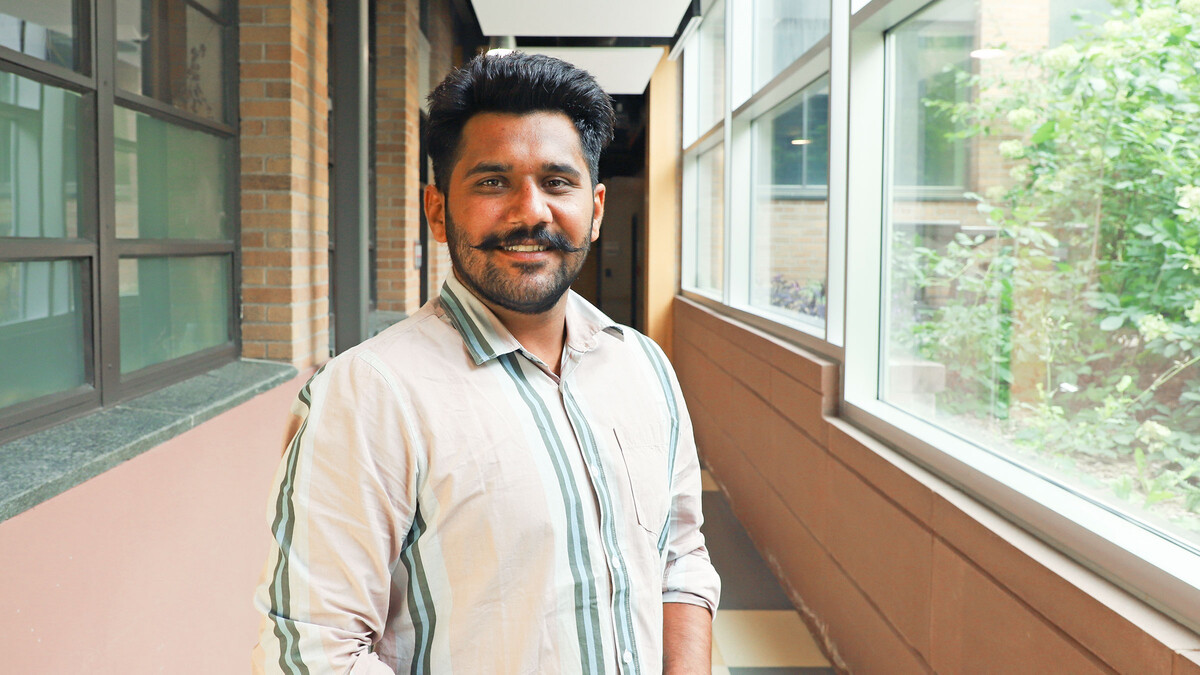
Nebraska Athletics’ announcement of its new #NILbraska initiative made national news in June. The stories were among 45-plus featuring Husker faculty, staff, students, centers and programs during the month.
The initiative, which aims to educate Husker student-athletes on branding, marketing, financial literacy and other topics related to name, image and likeness, was featured in stories in MSN.com on June 3 and The Wall Street Journal on June 24.
“Nebraska is committed to being a leader and trendsetter in the name, image and likeness arena,” Athletic Director Bill Moos said in a statement.
The Accelerate component of #NILbraska focuses on teaching student-athletes how to build a business around themselves. It will incorporate pop-up classes in the Colleges of Business, Journalism and Mass Communications, and Law.
“The goal was to create a program that sets a standard by leaning into Nebraska Athletics’ rich history of innovation,” Joe Petsick, assistant professor of practice in management, told MSN.com. “With Accelerate, we set out to create a program that was not just focused on how to help the student-athletes make money, but also how they can use tools to build a business around themselves.”
Moos; Petsick; Garrett Klassy, senior associate athletic director for external relations; and Lexi Sun, recent Husker graduate and volleyball player, were featured in the Wall Street Journal story.
“If our student-athletes really use their entrepreneurial skills and start their own business here, this fan base is going to support them for the rest of their life,” said Klassy, who was recently named interim athletic director upon Moos’ retirement.
Other stories on #NILbraska have appeared in KLKN, KPTM, the Lincoln Journal Star, News Channel Nebraska, the Omaha World-Herald (1, 2), The Athletic and The Chronicle of Higher Education.
More coverage:
Carrick Detweiler, computer science and engineering, CEO and co-founder of Drone Amplified, was quoted in a June 1 Associated Press article on Congress moving to impose a five-year ban on U.S. government purchases of drones manufactured or assembled in China. Since China-based DJI dominates the market, there aren’t many affordable and reliable alternatives, Detweiler said. It will take three or four years for the U.S. market to reach parity, he said. The story was picked up by 170-plus media outlets.
Monique Farmer, advertising and public relations, wrote a June 2 PRSay article on the importance of a thoughtful public relations strategy to an organization’s success. She highlighted five common PR strategies: word-of-mouth, influencer, steady cadence of communication, top-of-mind and third-party credibility.
The U.S. Drought Monitor — produced jointly by the university’s National Drought Mitigation Center, the National Oceanic and Atmospheric Administration and the U.S. Department of Agriculture — was cited in multiple articles on drought conditions in the western United States: including in The New York Times (June 4), CNN.com (June 19), Los Angeles Times (June 19) and Newsweek (June 24).
The Drought Monitor was also cited in a June 14 Associated Press article on Des Moines, Iowa, water officials calling on residents to reduce their water use. According to the monitor, 46% of Iowa was in moderate drought, up from 29% the previous week. About a third of the state was abnormally dry, up from 25% the previous week. The story was picked up by about 20 media outlets.
Judy Wu-Smart, entomology, was interviewed for a June 4 New York Post article on viral beekeeper Erika Thompson. Wu-Smart said that Thompson’s technique isn’t necessarily dangerous for “experienced beekeepers who understand the biology and behavior of honeybees” and that many beekeepers work with minimal protection. However, “it’s not for just anyone to try, of course,” she said.
Humberto Blanco, agronomy and horticulture, was interviewed for a June 4 Newsy story on barriers to growing cover crops. He said well-established cover crops can mitigate the effects of climate change, such as soil erosion. More than two dozen media outlets, including KMTV, picked up the story.
A 2020 study by Kelli Boling, advertising and public relations, was highlighted in a June 5 NBC News article on Americans’ love of true crime multimedia. The study found that domestic violence survivors who listen to true crime podcasts felt they had become part of “a collective identity and a virtual community where their voices are heard, their stories are normalized.”
William G. Thomas III, history, was interviewed for a June 5 Washington Post article on whether Johns Hopkins enslaved people. He said the weight of evidence he has seen about the Hopkins family was that they were emancipationists. Johns Hopkins University’s announcement in December “is really aimed at demythologizing its history, and this is healthy and much needed,” he wrote. “The idea that the university was untainted by slavery is a fallacy, and it obscures the complicated, nuanced history of slavery in the United States.”
Jack Beard, law, was quoted in a June 7 Astronomy article on whether space tourism companies are prepared for medical emergencies in space. “There’s very limited facilities [on the space station],” he said. “To make matters worse, space is just incredibly dangerous and unhealthy. It’s easily described as ultra hazardous. Just by spending time on the International Space Station, there’s all these health conditions caused by microgravity, radiation or the G-forces you deal with.”
Julia McQuillan, sociology, was interviewed for a June 9 Huffington Post article on the child-free-by-choice movement. She said she isn’t surprised that experiences of women of color are rarely factored into stories on the movement. “There is little public outcry when Hispanic or Black women decide not to have children,” she said.
The University of Nebraska has received a five-year, $20 million award from the National Science Foundation’s Established Program to Stimulate Competitive Research to create a research and education cluster aimed at enhancing the state’s competitiveness in the field of emergent quantum materials and technologies, and boosting the participating institutions’ research and education capacity. Stories on the new Emergent Quantum Materials and Technologies (EQUATE) collaboration have appeared in at least four Nebraska media outlets and WebMD.
Brianna Buseman, animal science, was interviewed for a June 9 DTN Progressive Farmer article on the increased demand for local meat. People are more interested in meat production and how animals are raised and fed, she said. They want to know the local farmer and have a more local experience. “We saw increased demand for local meat before the COVID-19 pandemic, and now this trend is even more evident,” she said.
In 2019, a team that included Robert Streubel, physics and astronomy, managed to endow liquid droplets with permanent magnetism, partly by embedding them with tens of billions of iron oxide nanoparticles. Now, the team has shown the ability to tailor the magnetic properties of those droplets in multiple ways. Technology.org ran a June 9 article on the research.
Chad Brassil, biological sciences, and Carrie Hanson-Bradley, child, youth and family studies, were part of a multi-institutional team that has developed a new model for studying the effectiveness of teaching practices in a variety of classrooms at multiple universities. Campus Technology published a June 10 article on the project, dubbed ManyClasses.
Dale Grotelueschen and Brian Vander Ley, faculty in the university’s School of Veterinary Medicine and Biomedical Sciences, were featured in a June 11 BEEF magazine article on heart failure in feedlot cattle being on the rise. “(Feedlots) have learned to deal with it, but there is still a lack of understanding by veterinarians, as well as the beef industry,” Grotelueschen said. “This limits our ability to manage the condition. We need to learn how to identify risk factors that may predispose susceptible animals.”
Jeannette Jones, history and ethnic studies, was interviewed for a June 16 Omaha World-Herald article on Nebraska Gov. Pete Ricketts announcing his opposition to critical race theory. She said the definitions the governor offered on his monthly call-in radio program reflect a lack of understanding of the theory and literature on it. Jones’ comments were also highlighted in a June 16 Vanity Fair article on the topic.
Philip Schwadel, sociology, co-wrote a June 16 piece for The Conversation with Sam Hardy, professor of psychology at Brigham Young University, on the “religion residue effect” on people who no longer identify as religious. “The morals and values of religious dones are more similar to those of religious Americans than they are to the morals and values of other nonreligious Americans,” the researchers concluded. The story was picked up by more than 20 media outlets.
A new University of Nebraska–Lincoln study shows that if Nebraska expanded the dairy industry across the entire supply chain, it could have an economic impact of up to $1.7 billion. Eric Thompson, economics, director of the Bureau of Business Research, discussed the study during a June 16 segment on RFD-TV.
“New Storytellers: The Research Institute in Digital Ethnic Studies,” hosted by the University of Nebraska–Lincoln, was featured in a June 17 story on Indian Country Today. Margaret Huettl, history and ethnic studies, a co-principal investigator, was interviewed for the story.
A renovation of the Selleck Hall food court, scheduled for completion by fall 2021, will include converting the Presidential Dining Room into a new space that allows for gluten-free meal options. Food Management highlighted the renovation in a June 18 roundup. David Annis, dining services, was quoted in the brief.
More than 700 people participated in the ninth annual Nebraska Football Road Race on June 20. The event is a fundraiser for pediatric brain cancer research. Stories on the race appeared in KETV, KLKN, KMTV and 247Sports.
The University of Nebraska–Lincoln and three partner institutions have received nearly $1 million to expand the Agricultural Genome to Phenome Initiative. Stories on the new grant funding appeared in Business Farmer, KLKN, Nebraska Ag Connection, The Fence Post, Seed Today and SeedQuest.
With the help of a 3D printer at Nebraska Innovation Studio, five Nebraska Engineering students recently fabricated a prosthetic leg prototype for Olive, a young tabby cat missing the lower half of her left foreleg. The York News-Times and Treehugger published articles on the senior project.
Timothy Schaffert’s upcoming novel, “The Perfume Thief,” has been featured in pre-publication lists in CrimeReads (1, 2), Entertainment Tonight, the Los Angeles Times, Oprah Daily and Publishers Weekly. Schaffert is the Rosowski Associate Professor of English and director of the creative writing program at Nebraska.
Nebraska Athletic Director Bill Moos announced June 25 that he would retire at the end of the month. Garrett Klassy, senior associate athletic director for external relations, was named interim athletic director. Stories on the announcement appeared in at least 20 Nebraska media outlets, as well as 247Sports, CBS Sports, ESPN, MSN.com, Yahoo! Sports and 350-plus other media outlets.
Dawn O. Braithwaite, communication studies, was cited in a June 29 Deseret News article on findings in the Annie E. Casey Foundation’s KIDS Count 2021 Data Book. Braithwaite said she supports child care subsidies but her top priority would be to ensure access to health care.
Makenna Kirchhoff, a junior integrated science major, was interviewed with her mother, Aundria, for a June 30 iGrow article on their business, Grow Hope Farms. The urban farm aims to help others learn how to feed the world through nutritional produce, as well as educate them on the importance of fresh food and the agriculture industry as a whole.
Faculty, administration, student and staff appearances in the national media are logged at http://newsroom.unl.edu/inthenews. If you have additions to this list, contact Sean Hagewood at shagewood2@unl.edu or 402-472-8514. If you have suggestions for national news stories, contact Leslie Reed at lreed5@unl.edu or 402-472-2059.







